Towards a negotiated settlement
In Zimbabwe:
A position paper prepared by the Peoples' Policy Committee (PPC) to His Excellency the President of the Republic of South Africa in his capacity as the mediator to the crises in Zimbabwe
1. Introduction
Following the SADC extraordinary summit held in Tanzania on 28 March 2007, the People's Policy Committee (PPC) which is a network of Zimbabweans based in the UK, would like to put forward its preferred position as regards the proposed 'SADC Initiative'. We begin with a tacit acceptance that Zimbabwe's crisis is an African problem requiring an African solution. The time has come for new, concrete proposals, promoted by African leaders and implemented by Zimbabweans from all political and ideological hues, to restore hope to Zimbabwe. On that note, PPC welcomes SADC's decision to appoint President Thabo Mbeki as the mediator to the actors in the protracted social conflict in Zimbabwe. It is hoped that his mediation shall tame the hydra of violence currently sweeping across the country and also usher in a new democratic dispensation. This position paper is premised on the assumption that His Excellency President Thabo Mbeki of South Africa is willing to consider submissions from voices other than those stakeholders so far invited to attend the consultative meetings in South Africa. Given the extraordinary and grave conditions now obtaining in Zimbabwe and the significant population of Zimbabwean exiles living here in the UK some of whom are members of our pressure group on whose behalf we are acting, it would be remiss of us not to make appropriate representations to the SADC-initiated process. The major issues and expected minimum outcomes from the process are largely a common cause. Accordingly, we restrict our inputs to those matters the further resolution of which will, in our assessment and in light of our country's chequered history, help create and deliver more enduring value, peace and national integration to all the people of Zimbabwe. In this context we would therefore have to address such issues as the aim of the negotiations, the creation of an enabling environment for genuine negotiations, the nature of the mechanisms for negotiation and therefore the question who would sit at the negotiating table, the cessation of human rights abuses, the possibility of the formation of a transitional government, the duration of the negotiations and the role of the international community in the negotiated resolution of the crises in Zimbabwe.
2. Multilateral negotiations
The People's Policy Committee (PPC) would like to submit to the mediator that the problem of Zimbabwe is so huge such that inter-party dialogue would be a limited an approach to it. It is hereby proposed that if any negotiations are to take place to end the hostilities and build durable peace and democracy in Zimbabwe, then those negotiations including the pre-negotiation agenda-setting phase should be all inclusive. It is the view of PPC that the mediator should extend the consultative informal talks to the members of the civil society, church, professional bodies and any other stakeholders who are keen to make such positive interventions in Zimbabwe. The perception that only the Movement for Democratic Change (MDC) factions and the ruling Zimbabwe African National Union (ZANU PF) party legitimately represent the aspirations of the people of Zimbabwe and should therefore be engaged on the negotiations is incorrect. A case exists for an all-inclusive process comparable to that which ushered independence and democracy to South Africa in 1994. In the context of Zimbabwe, this would bring together the coalition of democratic forces currently operating under the Save Zimbabwe Campaign in addition to the ruling party and external observers from UN, AU and SADC. If the press reports emanating from Pretoria are anything to go by, PPC would unequivocally and unreservedly endorse the mediator's stance on insisting on a broad-based crisis resolution approach.
3. Enabling Conditions for Negotiations
In consonant with other stakeholders, PPC strongly affirms the position that formal talks should only take place after the government has repealed some repressive pieces of legislation such as the Public Order and Security Act (POSA), Access to Information and Protection of Privacy Act (AIPPA) as well as the Broadcasting Services Act (BSA).On that note, the government should drop charges and release a legion of activists who are illegally being held in police cells on charges based on these unconstitutional laws. It is also the submission of PPC that the constitutional amendments that have been proposed by the ruling party should give way to the wholesale constitutional reform as enunciated in section 4 of this position paper. In furtherance of this constitutional condition, PPC would like to join many other voices including the 'Save Zimbabwe Campaign' in calling for the new constitution before the next presidential and parliamentary elections. As a matter of urgency the state should renounce violence on its citizens, stop abductions of activists and opposition members as well as refrain police brutality against innocent citizens. It is the considered view of the PPC that the EU should not lift the targeted sanctions on the ruling elite until the formal negotiations are underway and the government has demonstrated fully its commitment to allow a democratic transition process to take place in the country. PPC would also like to challenge the international community to enable all the actors, large and small with resources for them to participate fully at levels of the crisis resolution process.
4. A New Democratic Constitution
The position of the PPC is that the genealogy of the current problems in Zimbabwe is traceable to the National Constitution. Any diagnosis and prescription to the crisis which preclude the constitution is flawed and therefore irrelevant. The Lancaster House constitution was not cast on stone. Indeed it had been the expectation that in time, a new home grown supreme law of the land would be enacted by the people of Zimbabwe themselves in order to satisfy their local needs and realize their national aspirations. This is not the same thing as the piecemeal re-branding of the same document undertaken by the incumbent government over the years to satisfy its narrow partisan interests of keeping power at all costs. That there are serious limitations and flaws in the current Lancaster House Constitution and that these have given rise to issues of governance is widely accepted. More compelling however is the fact that this constitution has resulted in a highly centralised unitary system of government which we submit is unsuitable for a future democratic Zimbabwe. That the incumbent government has manipulated the constitution to entrench itself and the interests of its constituents is accepted but this is only a symptom of a problem arising from use of an inappropriate constitutional model coupled with individual greed and propensity for excesses. Re-branding of the existing constitution in the hope that a new government emerging from next year's elections would act in good faith and achieve enduring national integration is too large a risk to take now bearing in mind the genocide and trauma suffered by minority ethnic groups particularly the Ndebele in south western Zimbabwe from 1982 – 1987, the so called 'Operation Clean Up' which left 700 000 people homeless and the so called Chimurenga 3 which crushed the agriculture sector. It is for these reasons that PPC advocates for the mediator to help the various actors in Zimbabwe to constitute an 'All Stakeholders Convention' (ASC) to work out a new constitutional framework that shall usher in a new democratic order in the country. Participatory constitution making is today a fact of constitutional life as well as a good in itself. A democratic constitution-making process is critical to the strength, acceptability, and legitimacy of the new era in Zimbabwe.Inorder to avoid the recurrence of the current problems in the future PPC strongly advocates for a people driven constitution which shall take into account the histories, cultures, grievances and aspirations of all its citizens. In our view, it is only through effective decentralization of authority to autonomous regions/provinces in so doing creating self-perpetuating institutions such as those that would emerge under our recommended union constitutional blueprint, would human rights and equality of all Zimbabweans be adequately protected and entrenched. Experience in new democracies and old, demonstrates that if human rights are not adequately protected initially, it will be difficult to do so later.
- We further recommend that the president's term of office be limited to a maximum of two five year terms
- Ministers appointed under the new constitution should be subject to confirmation by parliament both at central and provincial governments' level.
- The judiciary must be an independent branch of government and not be under the Ministry of Justice. The judiciary should control its financial and administrative affairs free from executive involvement, though necessarily subject to parliament's ultimate control over the budget.
- The agreed constitution should be subjected to approval by the people through a referendum supervised by SADC and the African Union and observed by the international community.
- The agreed constitution should be subject to review by an expert commission at ten year intervals.
- The new Constitution must provide representative, accountable and multiparty government; respect for the rule of law; and the promotion of the fundamental human rights of all Zimbabweans.
5. Transitional Processes
PPC would like to propose the following sequence as a roadmap towards the resolution of the crises in Zimbabwe:
Prenegotiation Phase: - The mediator to consult the actors across the spectrum in order to set the agenda for the formal negotiations. These consultations can take the form of secret talks as already been happening but they should as a matter of principle be open to all stakeholder in Zimbabwe. The Prenegotiations are viewed by PPC as meant for bridging the chasm that lie across the various actors; the outcome of these meetings should be made known to the public at the appropriate time.
All Stakeholders Convention (ASC):- An All Stakeholders Convention composed of civil society, political parties, media , faith-based organisations, women , youths and student movements as well as all sectors of society that are willing to contribute to this process should be constituted. The ASC should be organised into working groups so as to deal conclusively with all the critical issues in the crisis. PPC would like to propose the following working groups; (a) constitutional reform (b) land reform (c) electoral reform (d) truth recovery (e) economic recovery. The working groups would report to ASC for debate and approval The talks should lead to a power-sharing agreement on a transitional government, including opposition and civil society in key government posts, a new constitution, demilitarisation of state institutions, a new voters roll, a program of administrative and legislative reform guaranteeing genuinely free and fair elections on an agreed schedule and emergency economic recovery measures that could lead to full resumption of external financial support after elections. The stakeholders should agree on the composition and establishment of an interim authority to oversee the country's transition to democracy.
Dissolution of Parliament: - Incumbent president's departure from office when his term expires in March 2008 followed by the takeover by an interim government. An interim government would take responsibility for the basic administrative functions of the state until a new government is elected later in the process. Constitutional amendments such as are required to facilitate the creation of an interim government should be passed by the current parliament in the spirit of the SADC-led Initiative. As the process of normalising the constitutional and political situation develops, the international community should withdraw the targeted sanctions and other restrictions applying to the Zimbabwean government and initiate steps to assist in restoring democratic order and economic recovery in Zimbabwe.
Interim Government: - The All Stakeholders Convention should establish a transitional government, which should include the members of the opposition, civil society and the ruling party and provide for a rotating transitional presidency.
The mandate of the Interim government should include the following among others:
q organisation of a referendum for a new constitution and drawing up of a new voters roll; and
q Implementation of the transitional articles of the new constitution
q Professionalisation of security and uniformed forces
q Repatriation of Zimbabwean community in the diaspora
The international community should be available to provide assistance to this process when required by the Zimbabwean negotiators. PPC would recommend that the African Union Force be deployed to give protection to the Interim Government.
Elections:- Following the ratification of the new Constitution, preparations should begin for new elections to be held no later than the end of 2008.The elections should be held under a new democratic constitution. The new constitution should provide for an Independent Delimitation Commission, 'Independent Electoral Commission', Media and Information Commission as well as the Security and Defense Commission all of which should be constituted in time to run both the Referendum and the Presidential/parliamentary elections. These elections should be based on the SADC principles and standards of holding democratic, free and fair elections. In that regard, the current electoral laws should be amended to meet the SADC principles and standards. The electoral reforms should also provide for the diasporans vote. An estimated 4 million Zimbabwean adults now live in exile outside Zimbabwe and have been disenfranchised by the incumbent government. PPC recommends that suitable arrangements be made to restore in full the voting rights of this community in time for the referendum as well as the parliamentary and presidential elections. International observers should be present to monitor the elections, to oversee the transition from the interim government to the new elected government, and to ensure that the elections are free and fair.
6. Truth recovery process
PPC would like to put it forward to the mediator that, for the purposes of building sustainable democracy in a failed state such as Zimbabwe, there is a need for a truth recovery process. While accepting the genuine doubts and fears around the issue of 'Truth', it is clear that many victims and survivors of the crises in Zimbabwe believe that some formal collective examination and acknowledgement of the past is necessary for them to find closure. The idea of truth recovery processes is based on the concept of 'transition', from crisis to peace or from one government to another. At its most basic, a truth process is meant to mark the end of one difficult era and the beginning of a new and better one. It is completely unacceptable, disrespectful and insensitive for any political leader to arrogate or appropriate to himself/herself the right to grant pardon to individuals that sponsored and committed human rights atrocities and state sponsored terrorism since independence in 1980. With or without a Truth and Reconciliation Commission, only the people of Zimbabwe can determine whether or not to take legal action against those who committed crimes against humanity and genocide against defenseless citizens. We would caution that this is a highly delicate matter which if not handled sensibly, could trigger conflict and war in future. The political leadership should honestly and publicly acknowledge responsibility for past political violence due to their acts of omission and commission. This would be seen as the first and necessary step having the potentiality of a larger process of truth recovery. When acknowledgement is forthcoming, we recommend that measured, inclusive and in-depth consideration be given to establishing an appropriate and unique truth recovery process. For this to develop, a team with local and international expertise should be established using a fair and transparent method to explore the specific feasibility of such a process.
The specific purpose of a truth recovery process:
- Promote reconciliation, peace and healing; and to reduce tensions resulting from past violence;
Clarify and acknowledge as much unresolved truth about the past as possible;
Respond to the needs and interests of victims;
Contribute to justice in a broad sense, ensure accountability and responsibility for past actions from organisations and institutions, as well as potentially from individuals;
Identify the responsibilities of the State, of military and police, and of other institutions and organisations for the violence of the past; and to make recommendations for change that will reduce the likelihood of future conflict.
The truth recovery process can take the form any of the following:
Truth and Justice Commission
Historical Clarification Commission
Truth and Reconciliation Commission
7. Reconstruction
The new government would face the daunting challenge of entrenching democracy and peace, rebuilding the battered economy and resuscitating collapsed social services. The negotiations should thus, come up with an economic recovery framework. The economic reconstruction is crucial to restoring order and providing social security for the generality of the population. Without it, the negotiated settlement will be meaningless to the general public. PPC would like to recommend the implementation of an emergency economic recovery plan to curb inflation, restore donor and foreign investor confidence and boost mining and agricultural production, including establishment of a Land Commission with a strong technocratic base and wide representation of Zimbabwean stakeholders to recommend policies aimed at ending the land crisis. To this end PPC would like the negotiators to engage with the Brettonwoods institutions at various levels of the negotiation process inorder to build the confidence for their engagement in the reconstruction phase of this conflict resolution process.
10. Conclusion
In lieu of conclusion, PPC would like to ask the mediator to invest in its belief because it is made in good faith for the benefit of present and future generations of Zimbabwe. We further recommend that you take into account views from a broad cross section of Zimbabweans both individuals and groups. We highly value and appreciate the leading role that the SADC and the South African government are playing in trying to reach a negotiated settlement in Zimbabwe, and hope that this will continue under the form of an All Stakeholders Convention (ASC) to establish a constitutional order. Should the government of Zimbabwe maintain its strategy of terror, human rights abuses, violation of democratic principles, and their disrespect of the rule of law by violently repressing popular pressure for a democratic constitution, free and fair elections, we challenge the SADC, AU, and all other international institutions to completely isolate it. When all is said and done, we recognise that history does not offer a nation many such moments as one that our beloved Zimbabwe now has to rediscover its identity and sovereignty by among other things writing a new people driven constitution.
We thank you for this opportunity.
The Peoples 'Policy Committee (PPC) is a network of Zimbabweans based in the UK. It is a non –governmental and non partisan net work of individuals and organisations whose core business is to influence public opinion towards the resolution of the crisis in Zimbabwe.
Contact Details
PPC
The People's Policy Committee
Number 8 Darcy Gardens
DAGENHAM EFFEX
RM 9 6BS, UK
TEL 00442080904153/00442084912228
FAX 00441964775003
peoplespolicycommittee@yahoo.com
Yahoo! Answers - Got a question? Someone out there knows the answer.
Try it now.








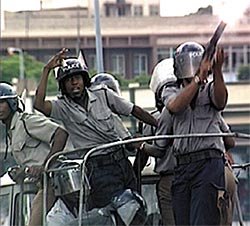



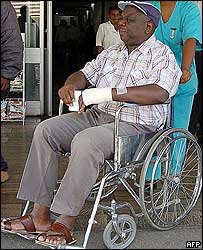
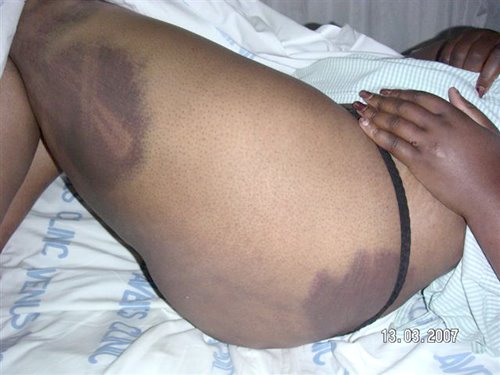
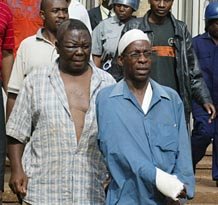
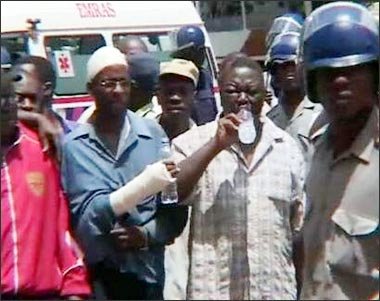
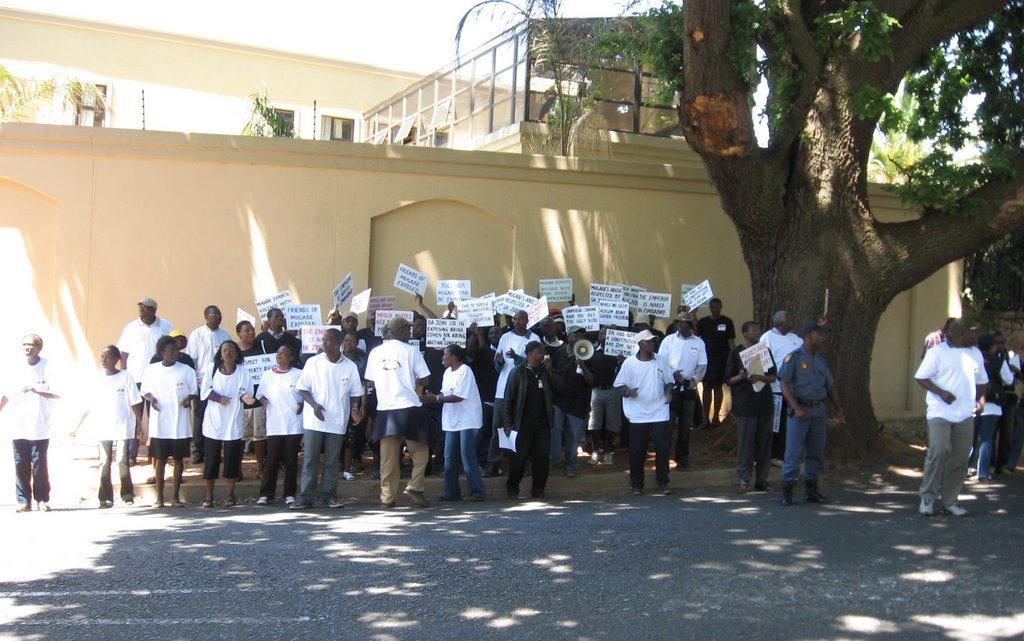
No comments:
Post a Comment